AUBURN — Shoe retailer and environmentalist Jim Wellehan doesn’t give disposable bags to his Lamey-Wellehan customers. He hasn’t for a year.
His customers are grateful, he said. “It makes sense asking them to bring their own bag.”
Not providing disposable bags has saved the Lamey-Wellehan shoe stores $8,000 a year, Wellehan said. He said he’s giving that $8,000 away in college scholarships to two Maine students each year.
Wellehan would like to see Auburn and Lewiston do what Portland did: pass a city ordinance that says consumers must pay 5 cents per disposable bag in grocery stores. The goal is to help get plastic litter out of the environment.
But before implementing a bag fee, “there’s a need for education on it first,” Wellehan said. Reducing bags “is something we have to consider. Downtown Lewiston, there’s all this litter. Over the backs of streets, alleys.” When plastic bags are discarded, “they get in the Androscoggin and go to the ocean. We’re doing some awful things to the environment.”
Portland’s law took effect April 15. Shoppers pay 5 cents for paper or plastic bags in stores that make more than 2 percent of their revenue from groceries. Portland also banned Styrofoam food trays and cups.
The goal, according to Portland City Councilor Jon Hinck, is to reduce nonbiodegradable waste.
Other municipalities that are considering similar laws include Brunswick, Topsham, Falmouth, Freeport, York and South Portland, according to Sarah Lakeman of the Natural Resources Council of Maine. It’s a small movement, she said.
Many California towns have banned plastic bags and the state has passed a ban on single-use plastic bags.
What’s wrong with plastic bags?
The average person gets about 320 plastic bags a year, which altogether requires 100 billion barrels of oil to produce, Wellehan said. Plastic bags aren’t good for the Earth.
“When they get into the environment, they break into smaller pieces but they never break down,” Lakeman said. “They’re not biodegradable.”
They fly in the wind, get stuck in plants and trees, get into waterways, litter streets and can clog city drains, Hinck said. “It’s costly clearing it out.”
In Portland, discarded bags cover the Back Bay neighborhood, Lakeman said. “It’s crazy how much plastic is out there. It’s a real issue.”
Worldwide, there are large sections of oceans where nothing lives because of plastic garbage. Fish eat the plastic, which is not good for the fish or the humans eating the fish.
In the first week of the new ordinance in Portland, “it seems to be going well,” Hinck said. Some stores have reported more customers bringing reusable bags.
Portland’s Director of Communications Jessica Grondin said Tuesday she had not received complaints. Positive comments have been posted on social media, she said.
Initially, Portland was going to keep the nickel per bag to help clean the city, but mom-and-pop store owners said keeping track of the money and giving it to the city would be a burden, Hinck said. So the law allows stores to keep the nickel.
Hannaford supermarket spokesman Eric Blom said the chain took no position on the fee, but since 1990 has encouraged customers to use reusable bags.
From March 29 to April 14, Hannaford’s Portland stores gave 100,000 reusable bags to customers and posted signs about the bag fees. Most customers were aware and appreciated getting free reusable bags, Blom said.
Plastic and paper bags do cost stores money, but not a whole nickel, Blom said. After the company figures out the bag costs, he said, Hannaford plans to donate the balance of the 5 cents to hunger-relief programs.
Some Portland residents objected to the ban, saying they use plastic bags for kitty litter, dog waste or to line waste cans. The ordinance doesn’t mandate fees for bags at pharmacies, restaurants or non-grocery businesses.
The big problem, Hinck said, is, “They’re free.” Without even thinking about it, “we’ve gotten used to it.”
For most people, a nickel isn’t much, but Mainers are frugal, he said. “We don’t want to spend it if we don’t have to. A nickel is a reminder to bring a reusable bag.”
Wellehan agreed, saying people don’t need a new bag every time they shop.
“When I was a kid, every GI had cigarettes,” he said. “Asbestos was a wonderful building material. We used a lot of DDT. Paint had lead. Sometimes we do dumb things that we’ve got to rethink.”
Auburn mayor opposed to ‘new tax’
AUBURN — Calling it another “tax,” Auburn Mayor Jonathan LaBonte said he wouldn’t favor a local law charging consumers for disposable grocery bags.
“If the intent is to increase recycling or reduce litter, the Portland model of letting a store charge you a nickel and keep that nickel doesn’t make any sense,” LaBonte said. “For Auburn, we need to focus on not being ranked among the communities with the lowest recycling rates in Maine. Adding a new tax at the grocery store won’t fix that.”
Sue Rioux of Durham came out of Hannaford’s on Monday with a cart of food in reusable bags. She said she’s torn about bag fees. The biggest hurdle is remembering to bring reusable bags, she said.
Brenda Nolan’s groceries were in plastic bags. She said she forgot reusable bags that day. If there were local bag fees like in Portland, “I probably wouldn’t use them,” she said.
Nolan said she can see environmental reasons but doesn’t favor bag fees. “I use these at home, as trash liners or for cat litter.”
Auburn City Councilor Mary LaFontaine said she has mixed feelings. “I’m willing to explore all options for the sake of the environment,” LaFontaine said. “But let’s let Portland try this and see how it goes.”
For more:
www.surfrider.org/coastal-blog/entry/the-proliferation-of-the-plastic-bagban
www.bagitmovie.com/contact.html
www.meriresearch.org/RESEARCH/MicroplasticsResearch/tabid/351/Default.aspx
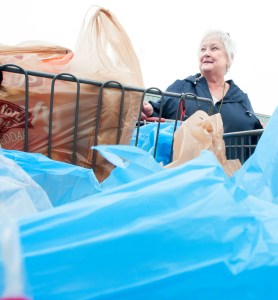
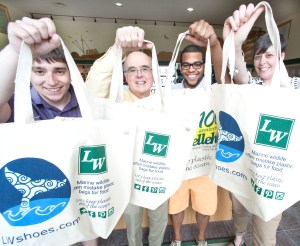
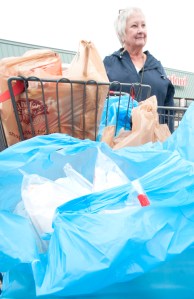
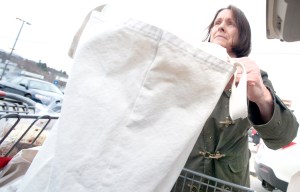
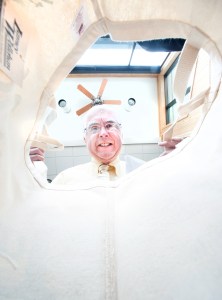
Comments are no longer available on this story